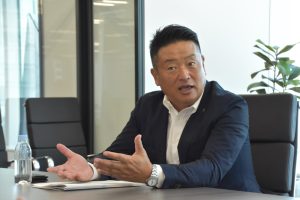
Taro Komiya
I joined JMA in 1995. I have been in the exhibition business since 2002, and I feel that exhibitions have changed a lot over the past three years. The pandemic was a major crisis for us, but I also believe it was a good opportunity to reevaluate conventional thinking. Although the exhibition business had been going strong until 2019, the steadily rising numbers alone without any major changes made me realize that there is type of knowledge that can only be born in a crisis situation. It has been a difficult three years, but at the same time, it has also been three years of opportunity for JMA to accomplish a number of transformations. For us, exhibitions are not only a means to achieve the JMA’s mission of industrial promotion, but also a demonstration of our national strength. After World War II, Japan rapidly recovered from its defeat and became a world-class manufacturing powerhouse, but today it is once again beginning to lag behind the rest of the world. In order for Japan to straighten its national image in the future, it is important to build friendly relations with other countries and focus on outbound travel. JMA’s council members include leading industrial companies and we believe that a shortcut to industrial development is to listen thoroughly to problems and requests and find a way to solve them. Exhibitions are a particularly effective means of doing so and must continue to be held in the future without interruption. We hope for the soonest recovery, as at the moment, the exhibitions that were canceled in the early days of the pandemic are still only back to 50-70% of their original scale.
Takeshi Tanaka
I strongly agree with what you said about showing national strength. Despite Japan’s economic affluence, there are not many huge events that attract people from around the world, and even Tokyo Big Sight, the largest facility in Japan, has a total exhibition area of only 115,420 square meters. If we can create several events that attract international attention and create a situation where representatives of industry must visit Japan, we can call that a national strength. Japan has great potential to become one of the key players. The country is internationally acclaimed for its safety, food, and attractive tourist resources, and all that is needed is a place where people can gather together. We believe that this can be achieved by political leaders and chief executives showing leadership, taking the initiative in Asia, and growing Japan and Asia into an economic zone that can compete with the West.
ーThe first event that comes to mind when people around the world gather together is CES in Las Vegas, USA.
Taro Komiya
It may be difficult to bring a huge event like CES to Japan as it is, but it may open up new possibilities if we can propose tourism based on one-stop regional cooperation, which is an advantage of an island nation. The key to MICE is how to make the most effective use of existing resources.
Takeshi Tanaka
I feel that FOODEX JAPAN, the largest exhibition in Japan organized by JMA, also connects Japan and the world, through food. If such exhibitions could be held in a variety of fields, it would not only enhance Japan’s image but also create a positive impact on the economy. FOODEX JAPAN has the momentum, energy, and potential to make us believe so.
Taro Komiya
FOODEX JAPAN serves as a gateway for overseas businesses to debut in Japan. Japan has strict food safety and quality control standards, so if the product meets those standards, it would be accepted everywhere else. I feel that the rules are often decided by the West but we should not just be swayed along. We need to be able to say with pride, “This is Japan.”
Takeshi Tanaka
The first step is to take the initiative in Asia through morale, diligence, and high quality. We would like to contribute through the exhibition so that Japan can remain a vibrant and lively country.
